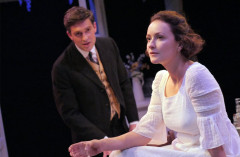Review: MISS JULIE at the Jermyn Street Theatre
 Revived in a new adaption by Howard Brenton, August Strindberg’s Miss Julie seems to have acquired a breath of new life in this 70 seat studio-theatre.
Revived in a new adaption by Howard Brenton, August Strindberg’s Miss Julie seems to have acquired a breath of new life in this 70 seat studio-theatre.
This kitchen sink drama set in Sweden on Midsummer’s Eve starts with Kristin, The Cook (Izabella Urbanowiz), whipping up a piece of real kidney for her Fiancée Jean (James Sheldon). The drama hinges on the forbidden but sizzling relationship between Jean and the lady of the house, Miss Julie (Charlotte Hamblin). On this night, Miss Julie is determined to entertain herself and ends up joining the servant’s party, possibly due to a budding crush on Jean. After Kristin goes to bed, Miss Julie begins to play a fun, beer-filled flirtatious game with Jean which then descends into something neither of them were seemingly prepared for.
These scenes between Jean and Miss Julie are filled with sexual tension and bubbling promises of love. Jean is obsessed with class, and their exchanges are filled with quips and jibes about Miss Julie’s privilege. Hamblin and Sheldon are extremely strong in these scenes, ardently portraying the personal agendas of both of their characters hidden behind these teasing games. All this action unfurls in Louie Whitemore’s quaint and beautiful set, including of a real working tap and cooker, which reflects the state of the world around them. As the kitchen gets messier and loses order, so does the conversation between Jean and Miss Julie. Jean claims to have always been infatuated with Miss Julie, and Hamblin expertly switches between a hateful hard exterior and a fragile almost bird-like girl who softens at the idea of love.
The post-coital morning is where it all descends into animalistic chaos. Miss Julie enters the kitchen, wearing Jean’s shirt, and begins to drink again. When Jean enters and changes his tune from the night before, the two of them enter a different dynamic, switching between moments of passion and moments of spitting acid-like abuse at each other. Jean brands Miss Julie a “wretch of a woman,” but then in the next breath says she is a “wonderful woman, way too good for me.” They both grapple to find some stability in a collapsing situation, and the actors expertly find rage and humour in these moments. Hamblin's Julie is truly unpredictable and resembles an animal in a cage in these moments.
In this adaptation, it is clear that Miss Julie is the victim, with Jean convincing her that she is a “victim of some kind of madness.” Despite this play being first premiered in 1893 to a shocked audience, it still holds resonance today about ‘gas-lighting’ and the treatment of women around the topic of love and sex. This classy, punchy production is a testament to this classic tragedy and strikes a perfect note of realism.
Latest News

 Beatrice Penny-Touré to join West End production of THE PHANTOM OF THE OPERA
6 February 2026 at 13:59
Beatrice Penny-Touré to join West End production of THE PHANTOM OF THE OPERA
6 February 2026 at 13:59

 Initial cast and creative team for ROSIE A NEW MUSICAL West End premiere concert
6 February 2026 at 10:02
Initial cast and creative team for ROSIE A NEW MUSICAL West End premiere concert
6 February 2026 at 10:02

 Review: MONSTERING THE ROCKETMAN at Arcola Theatre
6 February 2026 at 09:01
Review: MONSTERING THE ROCKETMAN at Arcola Theatre
6 February 2026 at 09:01

 HERE THERE ARE BLUEBERRIES at Stratford East - First look images released
5 February 2026 at 15:35
HERE THERE ARE BLUEBERRIES at Stratford East - First look images released
5 February 2026 at 15:35
